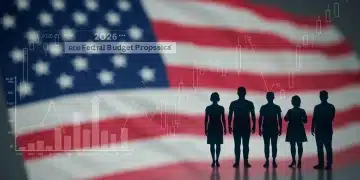Read breaking news about government policies affecting the economy

Government economic strategies impact citizens’ daily lives by influencing job opportunities, tax rates, and public services, making it essential for individuals to stay informed and adapt accordingly.
Have you seen how read breaking news about government policies impacting the economy can shape your understanding of financial matters? These updates are crucial as they influence your daily life and decisions.
Understanding recent government policy changes
Understanding recent government policy changes is essential for navigating our economy. These policies can significantly affect your daily life, finances, and future planning. Staying informed helps you make better decisions.
Key Areas of Influence
Recent changes in government policies are often focused on several key areas:
- Tax regulations: Changes in tax laws can directly impact your income and savings.
- Public spending: How the government allocates funds can influence job creation and public services.
- Trade agreements: Modifications in trade policies can alter the cost of goods and services.
Each of these areas is interconnected and has far-reaching impacts. For instance, a change in tax regulations may lead to variations in disposable income for families. This, in turn, influences overall consumer spending, which holds a crucial role in economic growth.
Impacts on Different Sectors
Different sectors respond uniquely to government policy adjustments. The education sector, for example, may see shifts in funding that affect tuition rates. Similarly, the healthcare industry can experience changes in regulations and funding that can affect service delivery.
- Education: Funding changes might lead to increased or decreased tuition costs.
- Healthcare: New policies could improve or restrict access to healthcare services.
- Small businesses: Policies can offer incentives or create challenges that impact local enterprises.
Understanding these nuances can empower individuals and businesses to adapt and thrive amidst changing regulations. While it can be challenging to keep track of every change, focusing on the primary areas most relevant to you leads to more informed decisions.
In conclusion, being aware of how recent government policy changes affect various aspects of the economy encourages proactive engagement with your financial future. As policies evolve, staying informed ensures that you can navigate confidently.
Impact of government policies on economic growth

The impact of government policies on economic growth is significant and multifaceted. These policies shape the environment in which businesses operate and influence the decisions made by consumers. Understanding these dynamics can help you navigate financial choices more effectively.
Fiscal Policies and Growth
Fiscal policies, such as government spending and taxation, play a crucial role in influencing economic growth. When the government increases spending, it can stimulate demand for goods and services, leading to economic expansion. Conversely, high taxes can reduce disposable income, impacting consumer spending.
- Government spending: Investments in infrastructure can create jobs and boost economic activity.
- Tax incentives: Lowering taxes for businesses can encourage investment and innovation.
- Public services: Quality of education and healthcare impacts workforce productivity.
Both consumers and businesses can feel the effects of fiscal policy changes. For example, when government spending increases, it often leads to greater job creation, which can enhance overall economic stability. Additionally, tax cuts for individuals can increase spending capacity, which encourages businesses to expand as demand rises.
Monetary Policies and Economic Growth
In addition to fiscal policy, monetary policy also significantly impacts economic growth. Central banks manipulate interest rates and control money supply to influence inflation and unemployment levels. Lower interest rates can boost borrowing and spending, while higher rates can slow down an overheated economy.
- Interest rates: Low rates encourage borrowing and investment.
- Money supply: Increasing the money supply can lead to higher spending levels.
- Inflation control: Keeping inflation in check ensures purchasing power remains stable.
The delicate balance maintained by central banks is crucial for fostering sustainable economic growth. When policies are aligned to support growth while managing inflation, the economy can flourish, leading to improved living standards.
Monitoring the effects of government policies on economic growth enables individuals and businesses to anticipate changes and adapt strategies accordingly. By being proactive, you can make informed decisions that align with the evolving economic landscape.
How citizens can adapt to new economic measures
How citizens can adapt to new economic measures is crucial for maintaining financial stability and leveraging opportunities. With every policy change, individuals face new challenges and must find ways to navigate them effectively.
Understanding the Changes
It is essential to stay informed about the latest economic measures. Knowledge empowers citizens to make educated decisions. Subscribe to newsletters and follow reliable news sources to grasp how policies can affect your finances. Understanding the changes helps you anticipate what’s ahead.
- Read news articles: Regularly check updates on economic policies.
- Attend community meetings: Engage with local leaders discussing economic changes.
- Join discussion groups: Share insights with others for a broader understanding.
Awareness is the first step toward adapting. Recognizing how these policies impact your personal finances can help you adjust your budget and spending habits effectively. For example, if new taxes are imposed, you might need to find ways to cut back on non-essential spending.
Adapting Financial Strategies
Being proactive with your finances can make a significant difference. Adapt your budget to reflect economic changes and prepare for different scenarios. This may involve saving more or altering your investment strategy based on potential market fluctuations.
- Budget adjustments: Reassess and prioritize essential expenses.
- Emergency funds: Increase savings to manage unexpected costs.
- Investment diversification: Spread investments to minimize risk.
Citizens can also adapt by improving their skills. Learning new skills can open doors to better job opportunities, especially in a changing economy. Consider taking online courses or attending workshops to enhance your professional qualifications.
Engaging with local businesses is another way to adapt. Supporting local shops can strengthen the community and ensure that money circulates within your area, boosting the overall economy. Being an active participant in your local economy fosters resilience against wider economic changes.
Future outlook on government economic strategies

The future outlook on government economic strategies is dynamic and critical for understanding the evolving economic landscape. As governments respond to global changes and domestic needs, new strategies emerge that affect everyone.
Adapting to Global Trends
In a rapidly changing world, governments must adapt their economic strategies to align with global trends. Issues like climate change, digital innovation, and international trade shape these strategies. Nations are increasingly recognizing the importance of sustainability in economic planning.
- Green policies: Future strategies may focus on renewable energy sources and sustainable practices to combat climate change.
- Digital economy: Emphasizing technology and innovation will help businesses thrive and compete globally.
- Global cooperation: Building stronger international trade agreements can facilitate economic growth.
As these trends evolve, citizens and businesses must stay informed and be ready to adapt to new policies. Understanding these changes is vital for making decisions that align with economic forecasts and government priorities.
Investment in Infrastructure
Another key aspect of future economic strategies will likely involve significant investment in infrastructure. Improved transportation, communication, and utility systems can boost economic performance. Governments are recognizing that well-maintained infrastructure leads to a more efficient economy.
- Public transportation: Investments here can reduce congestion and benefit the environment.
- Broadband access: Expanding internet connectivity is crucial for broadening opportunities in a digital age.
- Smart cities: Utilizing technology to improve urban living can enhance quality of life.
These infrastructure enhancements pave the way for innovation and growth, enabling local economies to flourish.
Moreover, fostering a supportive environment for small businesses will likely be a cornerstone of future economic strategies. By offering incentives like grants, tax breaks, and training, governments can stimulate job creation and local economic development.
FAQ – Frequently Asked Questions about Government Economic Strategies
How do government economic strategies affect my daily life?
Government economic strategies can influence job availability, taxes, and public services, affecting your income and spending capacity.
What role does infrastructure investment play in economic growth?
Infrastructure investment enhances transportation and communication, leading to improved business efficiency and greater economic productivity.
How can I adapt to new economic policies?
Stay informed about changes, adjust your budget, and consider developing new skills to remain competitive in the job market.
Why is community engagement important for economic strategies?
Community engagement supports local businesses and fosters a stronger economy, ensuring that financial benefits circulate within the community.





